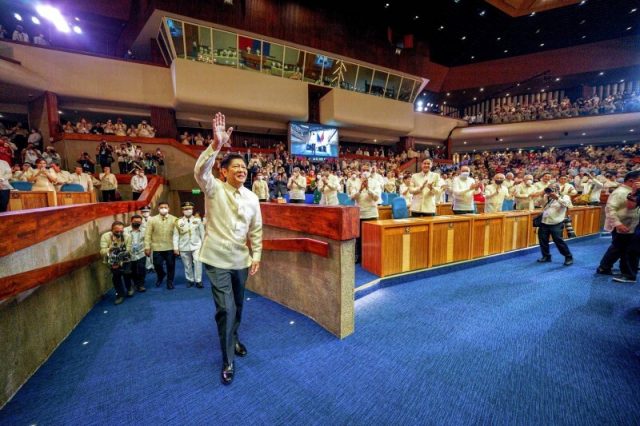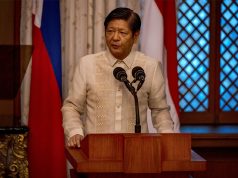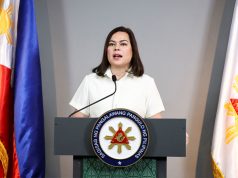
Standing ovations and the shifting from English to Filipino and back were among those noted by viewers of the State of the Nation Address on social media.
President Ferdinand Marcos Jr. delivered his first SONA, considered the most important presidential address, at the Batasang Pambansa Hall in Quezon City promptly at 4 p.m. on Monday, July 25.
It ended at around 5:19 p.m.
During more than an hour-long address, Marcos tackled different topics and issues of national concern such as economic reforms, tax reforms, infrastructure projects continuity, COVID-19 health response, public health reforms, face-to-face classes, climate change, and foreign policy.
RELATED: FULL TEXT: Marcos’ 2022 State of the Nation Address | Key points raised by Marcos in 1st SONA
Some viewers, meanwhile, noticed other speech-related and non-speech-related events that highlighted the prestigious event.
Standing ovation and claps
Similar to previous years, Marcos’s SONA received standing ovations and applause from the audience.
RELATED: An observation: Some ‘untimely’ clapping during Duterte’s final SONA
Attendees at the plenary stood up to clap on two occasions—when the decentralization of the healthcare system was mentioned and when he made a promise to protect the Philippines’ territory from any foreign power.
At least 30 claps with loud cheers also punctuated his speech at different intervals.
Some of his supporters who streamed the speech online were delighted by the audience’s reactions.
Others, however, wondered if Marcos’ words were worthy of the loud cheers.
“The need for a strong health care system is self-evident. People: yes yes. more claps. standing ovation,” one Twitter user said.
“Bro got a standing ovation for ‘we should build hospitals in the provinces’,” another user tweeted.
“Why did Marcos Jr. get a standing ovation for the nationalization of health infra?” another user asked.
Some online users likened the SONA to an awarding ceremony because of the jubilant applause.
“Why does it seem like the SONA is an awarding ceremony?” one user said.
Language shift
Some personalities, meanwhile, noticed Marcos switching between English and Filipino languages depending on the topic he was tackling.
James Jimenez, former Commission on Elections spokesperson, observed that no one was clapping in talks about data.
“Nung puro data, wala masyadong palakpak. Right?” Jimenez said.
“Also, did you notice the shift from English to Filipino?” he added.
Oscar Serquiña, an assistant professor of speech communication, perceived the audience signals as the shift of language.
“Marcos speaking in Filipino on the subject of agriculture, after a long spiel in English about the economy. What do we make of this? English for drivers of the economy, investors, businessmen; Filipino for farmers, fishermen, peasants. Language use as a marker of the class divide,” Serquiña said.
Others viewed the SONA writing as strategic and well-planned.
“English ang ginagamit kapag economic platforms. Filipino kapag social services at new normal. Halatang pinagplanuhan at plinantsa ang SONA. Alam kung sino ang target audience ng aling parte ng speech. Language matters. Sad to say, whoever wrote this speech knew that well,” one Twitter user said.
Reactions to Marcos’ remarks
Marcos describing Filipinos as an “English-speaking people” did not sit well with some.
“Hoy, anong ‘English-speaking people’ tayo, Marcos Jr??? Filipino language suddenly found in a ditch,” tweeted Karl Patrick Suyat, founder of Project Gunita.
Marcos expressed this in his discussion about the education sector’s medium of instruction amid the digital age.
The full statement was: “Therefore, the question of our medium of instruction must be continuously re-examined to maintain that advantage that we have established as an English-speaking people.”
Others were also worried about monkeypox, a disease that the World Health Organization declared as a global health emergency, following Marcos’ declaration against imposing lockdowns.
Yes naman wala ng lockdown
Monkeypox: hi
— zen (@zenbayb16) July 25, 2022








